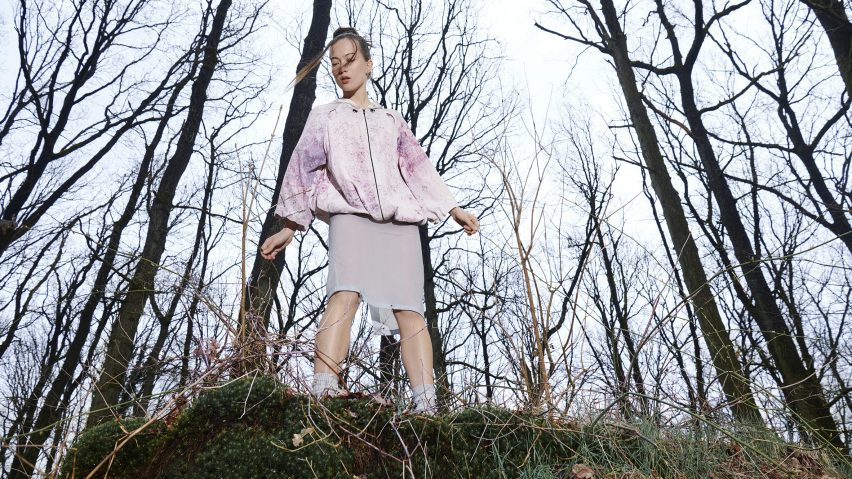After years of exploring the merging of biotechnology with design, Natsai Audrey Chieza and Christina Agapakis have started what they describe as the "first biodesign lifestyle brand", which launched at London Design Festival.
Titled Normal Phenomena of Life (NPOL), the brand will take the form of an online platform selling objects fabricated with the help of bacteria, algae, fungi, yeast, animal cells and other biological agents.
Biodesigned objects do not just use plant or animal matter as a material but are made by harnessing the natural processes of living organisms.
A silk jacket dyed with bacteria-produced pigment and a letterpress print created with ink grown by algae will be among the first products available on the platform, which will also focus on telling the stories behind the designs and developing consumers' "material literacy", according to Chieza.
"My vision for it is that not only does it story-tell and make visible the work of so many others under one umbrella, it also catalyses innovation and creates a less traditional framework for pushing products through a pipeline," Chieza told Dezeen.
Chieza is the founder of multidisciplinary agency Faber Futures, while Agapakis is the creative director of biotechnology company Gingko Bioworks.
Like many others in their field they hope that biodesigned inks, yarns and building materials, which are non-toxic and resource-efficient, could come to replace high-polluting and petroleum-based materials.
The duo decided to start NPOL following years of collaboration in this field that have seen them set up a residency programme and start the Ferment TV YouTube channel during the pandemic.
With NPOL, they aim to give themselves the ability to develop more prototypes, more quickly, while also setting up the infrastructure so that other biotechnology companies can channel their innovations into products.
The platform's own brand, NPOL Originals, which Chieza describes as "basically our R&D pipeline", will designate goods made together with partner companies "who don't have the bandwidth or don't have a clear pipeline for how they might bring a consumer-facing product to market".
Among the first NPOL Original products will be the Exploring Jacket and Musette, created together with biotech company Mbeu, designer Louise Bennetts and garment manufacturer Fabrika.
The unisex garment and accessory are made from silk that has been batch-dyed with the wild-type bacteria, streptomyces coelicolor, a microbe that naturally produces pigment.
There will also be the print series Lessons from the Living World: Breathe In, made by algal ink manufacturers Living Ink and designer and printmaker Kelvyn Smith.
The non-toxic, carbon-negative black ink is grown from algae, and the triptych's designs represent the role the plant plays in converting carbon dioxide into oxygen.
Alongside the NPOL Originals, the platform will stock products by other companies. Not all of these will be biotech-enabled, including books and cosmetics, but Chieza and Agapakis hope they will contribute to communicating the brand story in a world where true biodesign is still rare.
The platform will include mycelium goods, which are "still not mainstream enough", according to Chieza, despite their growing presence in design.
"We need ubiquity," said Chieza. "We need it to be everywhere. And it takes a lot of hard work and many years of dedication for that to be the case."
The NPOL founders' mission is to contribute to this ubiquity by creating informed conversations around biotech innovations that consumers may eye with suspicion.
"One of the reasons why we thought it was important to create a place like NPOL is because the boundaries between synthetic and natural are so grey now, with the emergence of these technologies," said Chieza.
"How do we create consumer insights into products that might be engineered with biology? How do we talk about the benefits of that? How do we problematise that in a way that is constructive and opens up critique from all of the right places?" she continued.
"It's very important that we have material literacy around the kinds of technologies that are mediating the living world and that are going to permeate our lives," Chieza added.
Chieza started in biodesign while undertaking her masters in Material Futures at London design school Central Saint Martins, from where she graduated in 2011. She went on to found her biotech-leaning multidisciplinary agency Faber Futures in 2018 and has become a leader in the field.
In 2021, she laid out a manifesto of five principles to advance the field of biodesign for Dezeen.
NPOL will launch during the London Design Festival with the exhibition This Is Living, on at the Design District, Building D4 in Greenwich from 16 to 24 September. For more information about events, exhibitions and talks, visit Dezeen Events Guide.

